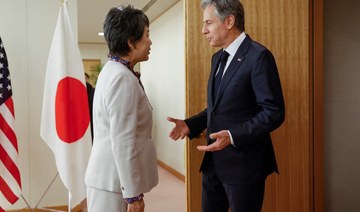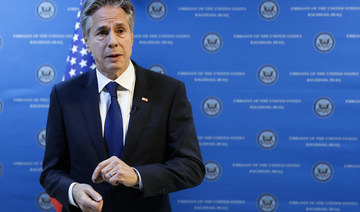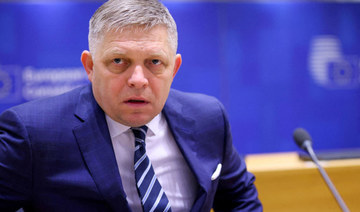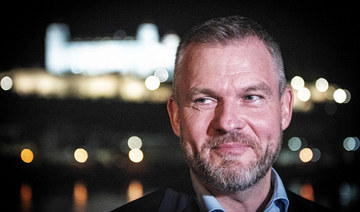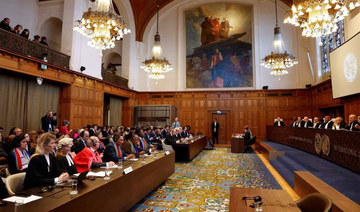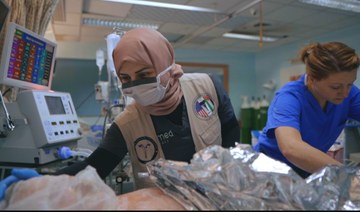NEW DELHI: US Secretary of State Antony Blinken said Friday that “far too many” Palestinians have died and suffered as Israel wages a relentless war against the militant Hamas group in the Gaza Strip. He urged Israel to minimize harm to civilians and maximize humanitarian assistance that reaches them.
Speaking to reporters in New Delhi, Blinken said recent Israeli moves to improve dire conditions in Gaza as its military pushes deeper into the strip — including pauses in military operations to allow Palestinians to move from northern to southern Gaza and the creation of a second safe corridor — are positive but they are not nearly enough.
“Much more needs to be done to protect civilians and to make sure that humanitarian assistance reaches them,” he said. “Far too many Palestinians have been killed, far too many have suffered these past weeks, and we want to do everything possible to prevent harm to them and to maximize the assistance that gets to them.”
Blinken spoke as he wrapped up an intense nine-day diplomatic tour of the Middle East and Asia — his second frenetic Mideast trip since the war began with Hamas’ deadly incursion into southern Israel on Oct. 7.
In Hamas-run Gaza, the Health Ministry said Friday that the Palestinian death in the coastal strip toll has surpassed 11,000 people. More than 1,400 people have been killed in Israel, mainly in the initial Hamas attack.
Blinken’s tour focused largely on the war amid growing international outrage over the destruction wrought on Gaza and demands for an immediate cease-fire. Neither Israel nor the United States support a cease-fire because they argue Hamas would take advantage of it to regroup and launch new terror attacks.
Blinken said the US has come up with additional proposals how better to protect civilians but did not elaborate.
US officials have said they would like to see Israel introduce longer “humanitarian pauses” in areas beyond the two established safe passage and exponentially expand the amount of assistance getting into Gaza from Egypt by increasing the flow of truck convoys.
The US also remains resolute to secure the release of Israeli and other hostages held by Hamas, get all foreigners who want to leave Gaza out, prevent the violence from spreader to the broader region, and to begin planning for what a post-conflict Gaza will look like, Blinken said.
Starting last week, Blinken’s marathon mission took him to eight countries — Israel, Jordan, Cyprus, Iraq, Turkiye, Japan, South Korea and India — as well as the occupied West Bank. But as he did on his previous Mideast tour last month, he encountered skepticism and outright resistance.
Israeli Prime Minister Benjamin Netanyahu in Tel Aviv last Friday rejected the idea of “humanitarian pauses,” saying military pressure on Hamas could not be eased.
“We are going full steam ahead,” Netanyahu said shortly after Blinken warned that Palestinians were being driven toward further radicalism that could perpetuate the unresolved Israeli-Palestinian conflict and leave Israel at greater risk.
Then, Arab foreign ministers accused Israel of war crimes, demanding nothing less than an immediate full-on cease-fire and dismissing Blinken’s call for post-conflict planning as naïve and premature while civilian deaths were rising.
“The Arab countries demand an immediate cease-fire that will end this war,” Jordanian Foreign Minister Ayman Al-Safadi told Blinken in Amman on Saturday.
Diplomatically, things weren’t looking much better.
During Blinken’s trip, both Jordan and Turkiye recalled their ambassadors to Israel in protest and made clear that Israeli envoys to their countries would not be welcomed back until the conflict was over.
Over the weekend, massive pro-Palestinian demonstrations against the war and US support for Israel rocked capitals around the world, fueling fears of unrest amid a global spike in both antisemitic and Islamophobic incidents.
By the time Blinken had visited Palestinian leader Mahmoud Abbas in Ramallah, made a brief stop in Cyprus, and flown on to Iraq and Turkiye on Sunday, it appeared he had won little, if any, support for most of his proposals.
Privately, however, US officials said they were making headway with Netanyahu on the humanitarian pauses and increased aid to Gaza and that the Arab states would in the interim support temporary pauses.
Leaving Ankara on Monday, Blinken acknowledged his efforts remained “a work in progress” while US officials, speaking on condition of anonymity to discuss internal deliberations, insisted prospects for at least some success were not so bleak.
In Tokyo on Tuesday, where Blinken attended a Japanese-hosted meeting of foreign ministers from the Group of Seven leading industrial democracies, there were fears that the bloc, which has overcome differences to remain united against Russia’s war in Ukraine, might split over the Middle East.
Both Japan and France, along with the European Union, had taken less forceful stances in support of Israel. The French had voted in favor of a UN Security Council resolution demanding a cease-fire that the US has vetoed. The other G7 members had all abstained on a similar but non-binding General Assembly resolution that the US had voted against.
Behind the scenes, US officials said momentum was shifting.
Israeli officials were beginning to warm to the idea that temporary rolling pauses could both benefit Israel militarily and show its willingness to ease civilian hardship. In the meantime, Arab leaders, including Iraqi Prime Minister Mohammed Shia Al-Sudani, were stepping up quiet efforts to keep the conflict from spreading.
After Blinken warned of consequences if Iranian-backed militias continued to attack US facilities in Iraq and Syria on Sunday in Baghdad, Al-Sudani had traveled to Tehran and met Iran’s Supreme Leader Ayatollah Ali Khamenei in a move US officials suggested was positive.
And, in Tokyo, after a forceful closed-door intervention by German Foreign Minister Annalena Baerbock, the G7 coalesced around a strong statement of support for all of Blinken’s priorities, including an unequivocal condemnation of Hamas and backing for Israel’s right to defend itself.
They also backed humanitarian pauses and corridors, post-conflict planning for Gaza, and an eventual restoration of a process to bring lasting peace through a two-state solution.
As Blinken concluded bilateral talks with South Korean leaders in Seoul and made his way to India, Israel announced daily four-hour humanitarian pauses, with a three hours’ notice, and the opening of a second safe corridor for Palestinians to leave northern Gaza to seek safety in the south.
“We appreciate the fact that” Israel finally agreed to the pauses, Blinken said as he stopped in New Delhi, more than a week after starting his mission.
“As I’ve said, from the start, this is a process and it’s not always flipping the light switch,” he said. “But we have seen progress. We just need to see more of it.”
Blinken says ‘far too many’ Palestinians have died as Israel wages relentless war on Hamas
https://arab.news/g234n
Blinken says ‘far too many’ Palestinians have died as Israel wages relentless war on Hamas
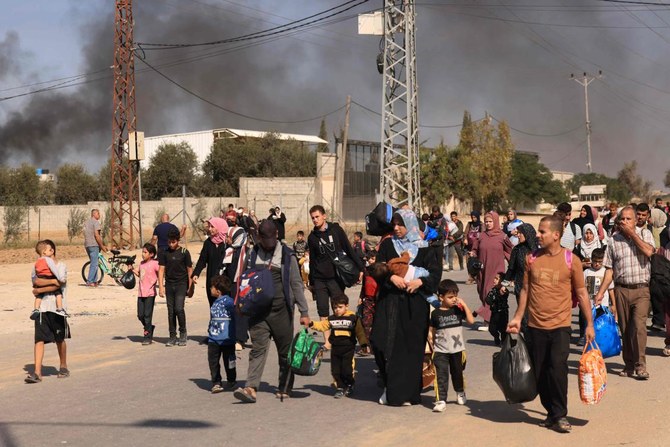
- “Much more needs to be done to protect civilians and to make sure that humanitarian assistance reaches them,” Blinken said
- “Far too many Palestinians have been killed, far too many have suffered these past weeks”
Slovak PM Fico no longer in life-threatening condition after being shot, minister says

- The assassination attempt happened while Fico visited the central Slovak town of Handlova
- Slovak media say the shooter is a 71-year-old man, and Fico's Cabinet saud it was politically motivated
BANSKA BYSTRICA, Slovakia: Slovak Prime Minister Robert Fico is no longer in a life-threatening condition after he was shot in an assassination attempt when leaving a government meeting on Wednesday, a government minister said.
The gunman shot Fico, 59, five times, initially leaving the prime minister in critical condition and undergoing surgery hours later on Wednesday evening.
“I was very shocked ... fortunately as far as I know the operation went well — and I guess in the end he will survive ... he’s not in a life-threatening situation at this moment,” Slovak Deputy Prime Minister and Environment Minister Tomas Taraba told the BBC’s Newshour.
Taraba said one bullet went through Fico’s stomach and a second hit a joint.
News outlet Aktuality.sk cited an unnamed source saying Fico was out of surgery and in stable condition.
Defense Minister Robert Kalinak told a news briefing hours earlier that Fico had suffered “serious polytrauma” after several shot wounds.
Interior Minister Matus Sutaj Estok had said earlier that Fico was in a life-threatening condition while he remained in the operating room.
“This assassination (attempt) was politically motivated and the perpetrator’s decision was born closely after the presidential election,” Sutaj Estok said, referring to an April election won by a Fico ally, Peter Pellegrini.
The shooting in the central Slovak town of Handlova, which Slovak media said was carried out by a 71-year-old man, stunned the small central European nation and drew international condemnation.
Slovakia, a member of NATO and the European Union, has little history of political violence. Russian President Vladimir Putin and US President Joe Biden joined Slovakia’s EU partners in expressing shock and condemnation of the shooting.
The country of 5.4 million has seen polarized political debate in recent years, including the hard-fought presidential election last month that helped tighten Fico’s grip on power.
Since returning as prime minister last October, Fico has shifted policy quickly. Opposition critics call it a power grab.
His government has scaled back support for Ukraine while opening dialogue with Russia, sought to weaken punishments for corruption and dismantled a special prosecutor’s office, and is revamping the RTVS public broadcaster despite calls to protect media freedom.
Fico has long been critical of Slovakia’s mainstream media, refusing to speak to some outlets. Members of his party blasted media and opposition actions in recent months.
“I ask all to stop piling attacks, expressions of hate, on social networks, in the media, which are aimed at that or another political camp, regardless if it concerns the (government) coalition or the opposition,” Sutaj Estok said.
After the attack, Fico was rushed to hospital in Handlova where he had been chairing a government meeting. He was then transported by helicopter to regional capital Banska Bystrica for urgent treatment, it said, adding that his condition was too serious for him to be taken to Bratislava.
A Reuters witness heard shots as Fico exited a building to shake hands with a crowd of people who had been waiting to greet him. Police then wrestled a man to the ground.
Slovak news media reported the shooter was a former security guard at a shopping mall, an author of three collections of poetry and a member of the Slovak Society of Writers. News outlet Aktuality.sk cited his son as saying his father was the legal holder of a gun license.
“I have absolutely no idea what my father intended, what he planned, what happened,” it quoted the son as saying.
Broadcaster TA3 reported the leftist prime minister had been hit in the abdomen in the attack.
“I don’t think I will wake up from this,” 66-year-old Lubica Valkova told reporters on the scene. “This kind of thing just can’t happen in Slovakia.”
Veteran leader
Fico, a dominant force in Slovakia for two decades, has drawn criticism for taking a more pro-Russian stance in the Ukraine war.
Describing the shooting as a “monstrous” crime, Putin said in a telegram sent to Slovakia’s President Zuzana Caputova: “I know Robert Fico as a courageous and strong-minded man. I very much hope that these qualities will help him to survive this difficult situation.”
Biden offered US help to Slovakia, saying in a statement: “We condemn this horrific act of violence.”
Slovakia’s biggest opposition party Progressive Slovakia called off a planned protest and called for restraint to avoid escalating tensions. Parliament suspended debate indefinitely after the attack.
In his career, Fico has moved between the pro-European mainstream and nationalistic positions opposed to EU and US policies. He has also shown a willingness to change course depending on public opinion or changed political realities.
An admirer of Hungary’s Prime Minister Viktor Orban, Fico has grown increasingly critical of Western support for Ukraine in its war with invading Russian forces.
Fico was forced to resign as premier amid mass protests in 2018 triggered by the contract killing of Jan Kuciak, a journalist who had been investigating high-level corruption. Those protests exacerbated divisions in Slovak society that still linger.
Putin arrives in China for state visit in a show of unity between the authoritarian allies

- On the eve of the visit, Putin told Chinese media that the Kremlin is prepared to negotiate over the conflict in Ukraine
- Ukrainian president has said any negotiations must include a restoration of Ukraine’s territorial integrity and withdrawal of Russian troops
BEIJING: Russia’s President Vladimir Putin landed Thursday in Beijing for a two-day state visit to China, in a show of unity between the authoritarian allies as Moscow presses forward with a new offensive in Ukraine.
Putin’s visit comes as Russia has become more economically dependent on China following Moscow’s full-scale invasion of Ukraine more than two years ago.
On the eve of the visit, Putin said in an interview with Chinese media that the Kremlin is prepared to negotiate over the conflict in Ukraine. “We are open to a dialogue on Ukraine, but such negotiations must take into account the interests of all countries involved in the conflict, including ours,” Putin was quoted as saying by the official Xinhua News Agency.
The Russian leader’s two-day trip comes as his country’s forces have pressed an offensive in northeastern Ukraine’s Kharkiv region that began last week in the most significant border incursion since the full-scale invasion began, forcing almost 8,000 people to flee their homes.
Along with Moscow’s efforts to build on its gains in the nearby Donetsk region, the 2-year-old war has entered a critical stage for Ukraine’s depleted military that is awaiting new supplies of anti-aircraft missiles and artillery shells from the United States.
“We have never refused to negotiate,” Putin was quoted as saying by Xinhua. “We are seeking a comprehensive, sustainable and just settlement of this conflict through peaceful means. We are open to a dialogue on Ukraine, but such negotiations must take into account the interests of all countries involved in the conflict, including ours.”
Ukrainian President Volodymyr Zelensky has said any negotiations must include a restoration of Ukraine’s territorial integrity, the withdrawal of Russian troops, the release of all prisoners, a tribunal for those responsible for the aggression, and security guarantees for Ukraine.
China claims to take a neutral position in the conflict, but has backed Moscow’s contentions that Russia was provoked into attacking Ukraine by the West, despite Putin’s public avowals of his desire to restore Russia’s century-old borders as the reason for his assault.
Putin has blamed the West for the failure of negotiations in the opening weeks of the war and praised China’s peace plan for Ukraine that would allow Moscow to cement its territorial gains.
“Beijing proposes practicable and constructive steps to achieve peace by refraining from pursuing vested interests and constant escalation of tensions, minimizing the negative impact of the conflict on the global economy,” he had said.
Putin said a Chinese proposal in 2023, which Ukraine and the West rejected, could “lay the groundwork for a political and diplomatic process that would take into account Russia’s security concerns and contribute to achieving a long-term and sustainable peace.”
The Kremlin said in a statement that during their talks this week, Putin and Chinese leader Xi Jinping will “have a detailed discussion on the entire range of issues related to the comprehensive partnership and strategic cooperation and determine the new directions for further development of cooperation between Russia and China and also have a detailed exchange of opinions on the most acute international and regional issues.”
The visit furthers the effort by China and Russia to topple the US-led Western democratic order in favor of a more authoritarian model that crushes political opposition, human rights and freedom of speech. Putin began a fifth term in office this month.
Speaking Tuesday in the upper house of Russian parliament, Foreign Minister Sergey Lavrov said Moscow and Beijing are “objectively interested in maintaining our lead in efforts to establish a more fair and democratic world order.”
“Russia and China aren’t alone in their efforts to reform an international system and help establish a multipolar global order,” he said.
Lavrov noted that the “duet of Moscow and Beijing plays a major balancing role in global affairs,” adding that “the Russian president’s forthcoming visit to (China) will strengthen our joint work.”
Moscow has forged increasingly close ties with Beijing as the war has dragged into a third year, diverting the bulk of its energy exports to China and relying on Chinese companies for importing high-tech components for Russian military industries to circumvent Western sanctions.
The Russia-China military ties have also strengthened. They have held a series of joint war games in recent years, including naval drills and patrols by long-range bombers over the Sea of Japan and the East China Sea. Russian and Chinese ground forces also have deployed to the other country’s territory for joint drills.
China remains a major market for Russian military, while also massively expanding its domestic defensive industries, including building aircraft carriers and nuclear submarines.
Putin has previously said that Russia has been sharing highly sensitive military technologies with China that helped significantly bolster its defense capability. In October 2019, he mentioned that Russia was helping China to develop an early warning system to spot ballistic missile launches — a system involving ground-based radar and satellites that only Russia and the US possessed.
South Africa seeks halt to Israel’s Rafah offensive at World Court

- The hearings on May 16 and 17 will only focus on issuing emergency measures, to keep the dispute from escalating
THE HAGUE: South Africa will ask the top UN court on Thursday to order a halt to the Rafah offensive as part of its case in The Hague accusing Israel of genocide in the Gaza Strip.
The hearings at the International Court of Justice, also known as the World Court, come after South Africa last week asked for additional emergency measures to protect Rafah, a southern Gaza city where more than a million Palestinians have been sheltering.
It also asked the court to order Israel to allow unimpeded access to Gaza for UN officials, organizations providing humanitarian aid, and journalists and investigators. It added that Israel has so far ignored and violated earlier court orders.
On Thursday, South Africa will present its latest intervention seeking emergency measures starting at 3 p.m.(1300 GMT).
Israel, which has denounced South Africa’s claim that it is violating the 1949 Genocide Convention as baseless, will respond on Friday. In previous filings it stressed it had stepped up efforts to get humanitarian aid into Gaza as the ICJ had ordered.
Gilad Erdan, Israel’s ambassador to the United Nations told Army Radio on Wednesday the short notice the court gave for the hearings did not allow sufficient legal preparation, adding that was “a telling sign.”
The Israel-Hamas war has killed nearly 35,000 people in Gaza, according to health authorities there. About 1,200 people were killed in Israel and 253 taken hostage on Oct. 7 when Hamas launched the attack that started the war, according Israeli tallies.
South Africa accuses Israel of acts of genocide against Palestinians. In January, the court ordered Israel to ensure its troops commit no genocidal acts against Palestinians in Gaza, allow in more humanitarian aid and preserve any evidence of violations.
The hearings on May 16 and 17 will only focus on issuing emergency measures, to keep the dispute from escalating. It will likely take years before the court can rule on the merits of the case.
The ICJ’s rulings and orders are binding and without appeal. While the court has no way to enforce them, an order against a country could hurt its international reputation and set legal precedent.
India says it is working to repatriate UN staffer killed in Gaza

- Waibhav Anil Kale, who was working with the UN Department of Safety and Security, and was killed while heading to the European Hospital in Rafah along with a colleague, who was wounded in the incident
NEW DELHI: India said on Wednesday it was working to repatriate the body of a former Indian Army officer serving as a UN staffer, who was killed in Gaza when his vehicle was hit by what the UN said was tank fire in Rafah where only Israeli tanks are present.
The staffer, Waibhav Anil Kale, was working with the UN Department of Safety and Security and was heading to the European Hospital in Rafah along with a colleague, who was wounded in the incident. The UN said he was the first international UN staffer killed in Gaza since the war began on Oct. 7, taking the total UN death toll to 191.
UN Secretary General’s deputy spokesperson Farhan Haq said on Tuesday the UN had set up a fact-finding panel to determine the responsibility for Kale’s death.
“It’s very early in the investigation, and details of the incident are still being verified with the Israeli Defense Force,” he told a press cconference. Asked by reporters about the shots fired on the vehicle, he said, “we believe it came from a tank in the area” and later added, it was “safe” to assume that only the IDF tanks in that region. There are 71 international UN staff members in Gaza currently, he said. The IDF said in a statement on Monday that the incident was “under review” and the IDF had not been made aware of the vehicle’s route. But an initial inquiry indicated that “the vehicle was hit in an area declared an active combat zone.”
The Hamas-run government’s media office accused Israel of “deliberately targeting foreign staff in the Gaza Strip.”
India’s Foreign Ministry said its diplomatic missions were “in touch with relevant authorities” on the investigation into Kale’s death, and helping to bring home his body.
In a statement on Monday after Kale’s death, UN Secretary General Antonio Guterres reiterated an “urgent appeal for an immediate humanitarian ceasefire and for the release of all hostages,” saying the conflict in Gaza was continuing to take a heavy toll “not only on civilians, but also on humanitarian workers.” He has demanded explanations for all their deaths.
ICC ‘excited’ as cricket’s newest stadium launched in New York

- Thirty-four thousand-capacity stadium will host hotly-anticipated India-Pakistan clash on June 9
- Stadium features infrastructure from Las Vegas Formula 1 circuit, drop-in pitches prepared in Florida
NEW DELHI: The newly-built Nassau County International Cricket Stadium, near New York, was launched on Wednesday with the sport’s world body “excited” to conquer new territories through the T20 World Cup in June.
The 34,000-capacity stadium, with infrastructure from the Las Vegas Formula 1 circuit and drop-in pitches prepared in Florida, will host the hotly-anticipated India-Pakistan clash on June 9, among its eight scheduled World Cup games.
The showpiece 20-over event will be co-hosted by the West Indies and the United States starting June 1 with New York, Florida and Dallas as venues.
The International Cricket Council (ICC) remains happy with the focus on the India-Pakistan clash and the Nassau project as part of bringing the game to the US.
“Yeah, absolutely! We can run that game anywhere and the interest in the fixture would be immense,” Chris Tetley, the ICC’s head of events, told reporters in a media roundtable.
“The news stories that we have seen and the media coverage in the US itself as well as among the cricket media around the world. I have not seen that before around an ICC event.”
Tetley added: “We are really excited to bring the T20 World Cup cricket to the US and the opportunity that it presents to the sport and from what I can see there is an audience really waiting for us to come.”
T20 Cricket will also feature as one of five new sports at the Los Angeles Olympics in 2028.
Making a cricket stadium in Nassau remained a huge challenge for the ICC, who got in Adelaide Oval curator Damian Hough for the job.
Hough created the first drop-in pitch in Adelaide in 2013 and the latest strips at the Nassau County ground promise good cricket and balance between bat and ball.
“People shouldn’t be concerned about drop-in pitches,” said Hough.
“They are proven around the world, definitely in Australia. Some of the best cricket is played on drop-in pitches and are really successful.”



